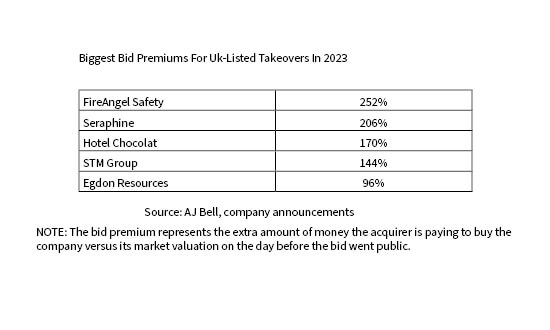


A big increase in the average takeover premium in 2023 highlights how parts of the UK stock market continue to be undervalued. The average bid premium in 2023 for UK stocks was 51% versus 37% in 2022 and 43% in 2021, according to analysis by AJ Bell.
Most London-listed takeovers last year involved small cap firms. Buyers were a mixture of private equity firms or industry players looking to buy rivals to gain scale or to get a foot in the door for a new sector or geography.
“There were no takeovers involving FTSE 100 companies in 2023 and only three for FTSE 250 stocks.”
The lack of large cap deals mean takeovers were not a contributing factor to the performance of the UK’s flagship index, the FTSE 100. Indeed, none of the 2023 London-listed takeovers involved FTSE 100 companies and only three FTSE 250 companies received a bid. This situation could change if interest rates start to fall.
Biggest bid premiums for UK-listed takeovers in 2023

Source: AJ Bell, Company announcements
Private equity firms flourished during the extended period of low interest rates, borrowing money cheaply to buy companies and using their cash flow to help pay off the debt. The sharp rise in interest rates over the past two years made debt financing more expensive and multi-billion pound or dollar transactions harder to stomach.
With signs that interest rates might have peaked and central banks might cut rates in 2024, we could see private equity firms go after bigger targets, particularly as many are sitting on significant amounts of cash (also known as ‘dry powder’ in the industry). We might also see large industry players make opportunistic bids for similar-sized rivals.
Reckitt and Unilever are ones to watch as potential large-cap takeover targets. Both are companies that had lost their way and are now trying to get back on track.
Advertising agency WPP could be a takeover target given share price weakness and an undemanding valuation, trading on 7.8 times forward earnings and an EV to EBITDA (enterprise value to earnings before interest, tax, depreciation and amortisation) ratio of 8.9. But concerns about the global economy in 2024 could throw icy water on the idea that someone would try and buy WPP in the near-term as earnings could come under pressure if clients scale back promotional activity.
After losing 39% of its market value in 2023 thanks to operational setbacks, weaker commodity prices and downgraded guidance for production, analysts have touted diversified miner Anglo American as a potential takeover target for someone like Glencore. While there is merit to this line of thinking, the mining sector has a history of buying at the top and not at the bottom. Miners show a tendency to only want to do deals when everything is going well, rather than risk spending money when key commodity prices are flat or falling, such as we are seeing now.
There were four common themes with UK takeovers in the year and one could expect similar trends in 2024.
The acquisition enables the buyer to expand into a new country.That is the rationale behind CoStar’s £100 million bid last year for property portal OnTheMarket. The purchase price is tiny compared to CoStar’s own $36 billion valuation, but strategically interesting as it gives the buyer a foot in the door for the UK market and the opportunity to try and take market share from Rightmove. CoStar is a big player in the US and this acquisition could give Rightmove and UK peer Zoopla sleepless nights.
Opportunistic bid following share price weakness in a rival.Mars pounced on Hotel Chocolat while its shares were depressed and offered a large premium to the market price to buy the business.
Private equity firms think about the bigger picture when buying undervalued companies.They often use the acquired business as a roll-up vehicle to make acquisitions in a certain sector or tap into a network of contacts to help improve the acquired company.
For example, Brookfield is in the process of buying London-listed Network International and has indicated a desire to merge it with another payments group it majority owns called Magnati.
The buyer takes the view the target would be better under private ownership.One of the downsides of being a listed company is constantly being in the spotlight. Investors are judging every move and that can be a distraction if a business is going through a challenging period and wants to focus on the recovery.
For example, Apollo just bought Wagamama-owner Restaurant Group and believes it is better away from public markets. Restaurant Group has suffered mixed fortunes in recent years – its posh pubs arm and Wagamama have been successful while there have been troubles elsewhere. The share price was incredibly volatile when Restaurant Group was a listed entity but Apollo is taking a long-term view and believes it can get the business back on track under private ownership.
Past performance is not a guide to future performance and some investments need to be held for the long term.
This area of the website is intended for financial advisers and other financial professionals only. If you are a customer of AJ Bell Investcentre, please click ‘Go to the customer area’ below.
We will remember your preference, so you should only be asked to select the appropriate website once per device.